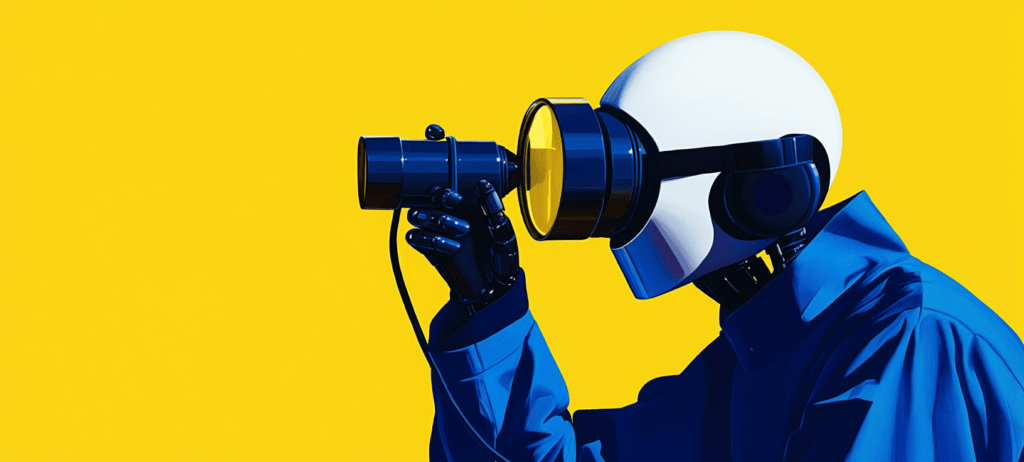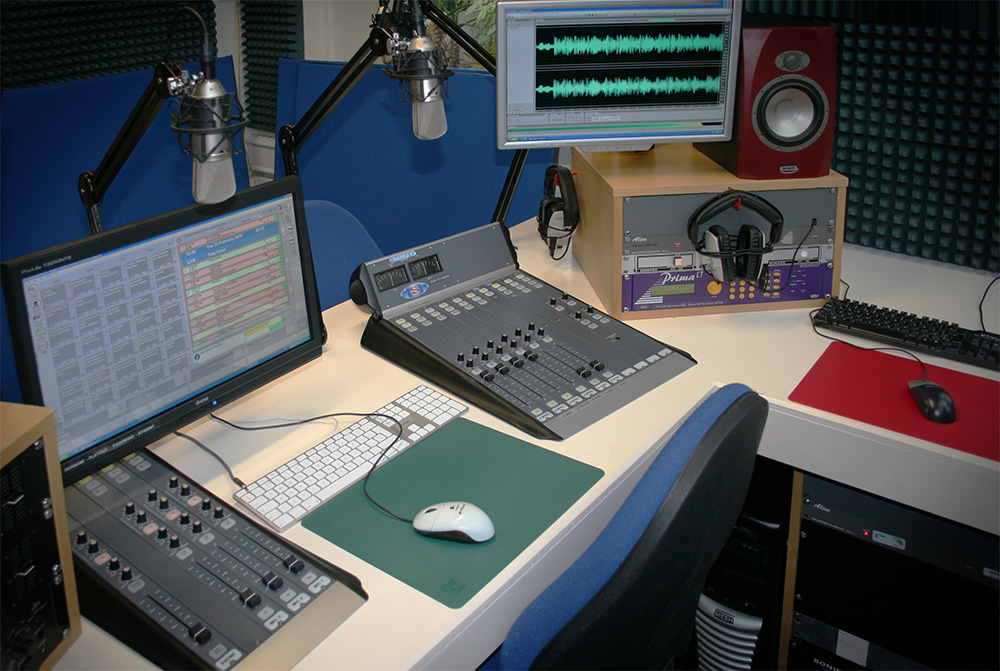-
 11 min. read
11 min. read
-
 Trevin Shirey
Trevin Shirey VP of Marketing
VP of Marketing
- Trevin serves as the VP of Marketing at WebFX. He has worked on over 450 marketing campaigns and has been building websites for over 25 years. His work has been featured by Search Engine Land, USA Today, Fast Company and Inc. Read his review of working with WebFX for the last 15 years.
Podcasts are this generation’s radio. Podcasting offers on-demand shows, free information, and huge marketing opportunities that all benefit producers, consumers, and advertisers. But marketers don’t just benefit from advertising on podcasts — they also benefit from making podcasts.
In this post, we’ll cover how podcasting and SEO work together, why you should use them, and how you can start a podcast for $135.
How podcasting and SEO work together
Like any other form of content, podcasting is a way for you to share your expertise with potential customers. It gives you the chance to create new pages talking about your podcast, new content to outreach to a variety of websites, and new email marketing points to draw visitors to your site. Even if you only have a group of people who listen to your show and don’t become customers, you’re still creating positive relationships that build brand awareness.
This is especially true since podcasting gives you the chance to partner with distribution and hosting networks, where users can find your content without prior knowledge of your brand, even on mobile. Unfortunately, that kind of benefit isn’t quantifiable. But on the other hand, it barely costs anything to create a podcast in the first place.
A 1% customer conversion rate from your podcast would pay for all of your production costs — and then some. Best of all, podcasts don’t have an expiration date. They’ll stay around as long as you want them, whether you’re hosting each episode on your site or uploading to multiple podcasting networks.
Podcasts are also some of the best ways to incorporate search saturation into your SEO marketing strategy. Currently, this only applies to mobile. But if you know anything about Internet marketing, you know Google changes more often than the tides. It’s possible that podcasts could also show up in desktop Google search results in the future, too.
Experiment #1: An ordinary podcast
Let’s take a look at my favorite improv comedy podcast as our first example.
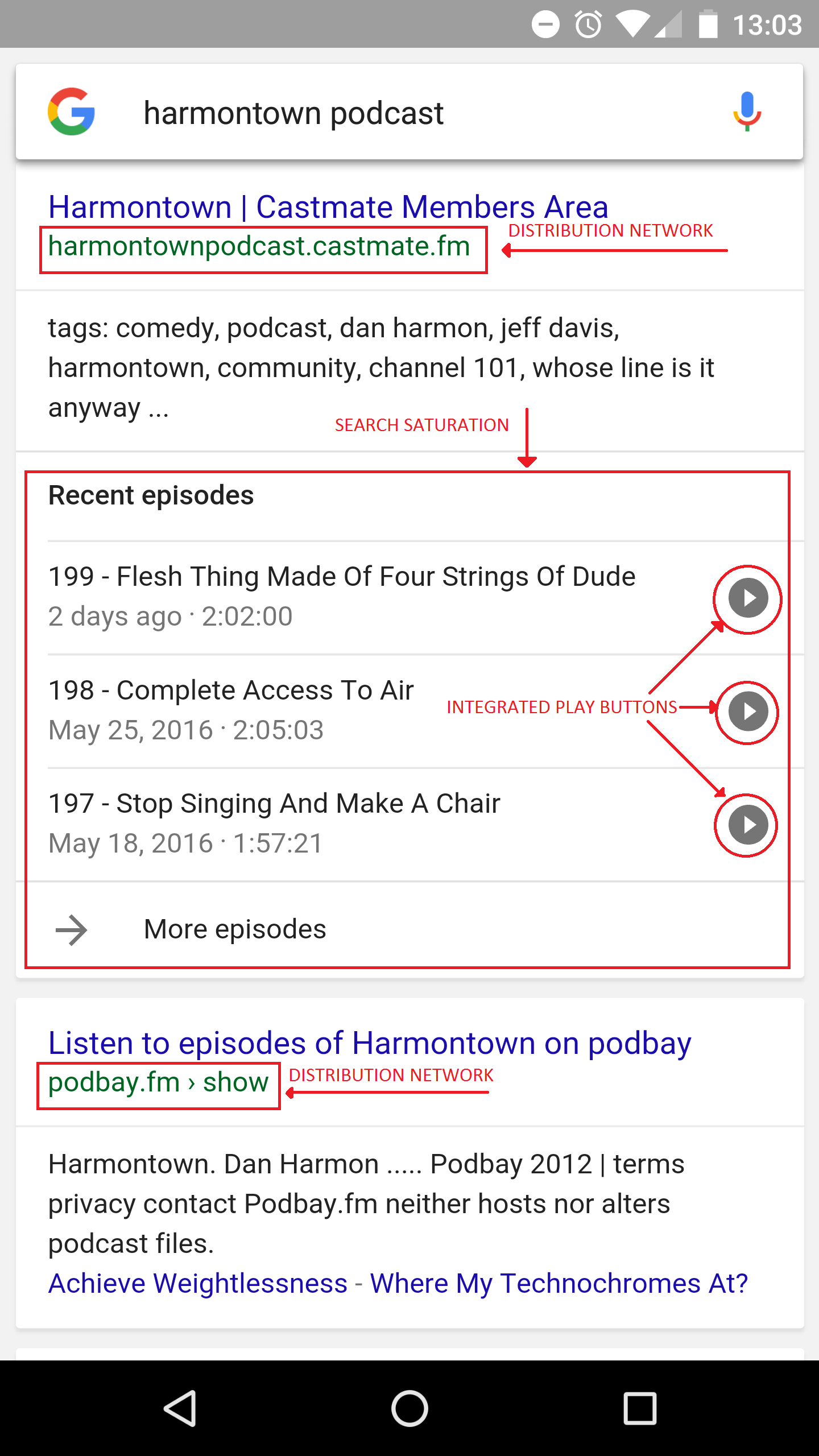 Looking up “Harmontown podcast” not only brings up the podcast’s home domain, but also a list of episodes pulled from that domain that takes up space in mobile search. In other words, podcasts are a form of search saturation on Android devices. And before you scoff at Android because it doesn’t include iPhone users, just keep in mind that Android has more than 1.4 billion active monthly users.
Looking up “Harmontown podcast” not only brings up the podcast’s home domain, but also a list of episodes pulled from that domain that takes up space in mobile search. In other words, podcasts are a form of search saturation on Android devices. And before you scoff at Android because it doesn’t include iPhone users, just keep in mind that Android has more than 1.4 billion active monthly users.
Plus, Harmontown is hosted on multiple podcast networks. That gives the podcast visibility on multiple sites, boosting the podcast’s overall popularity and reach. So if someone ever looks up your podcast on an Android device (which would probably at least happen once), you have almost total control over the search results.
Experiment #2: Business podcast with dedicated domain
Harmontown is just one example.
Let’s make sure it’s not a fluke by looking up one of my favorite business podcasts. 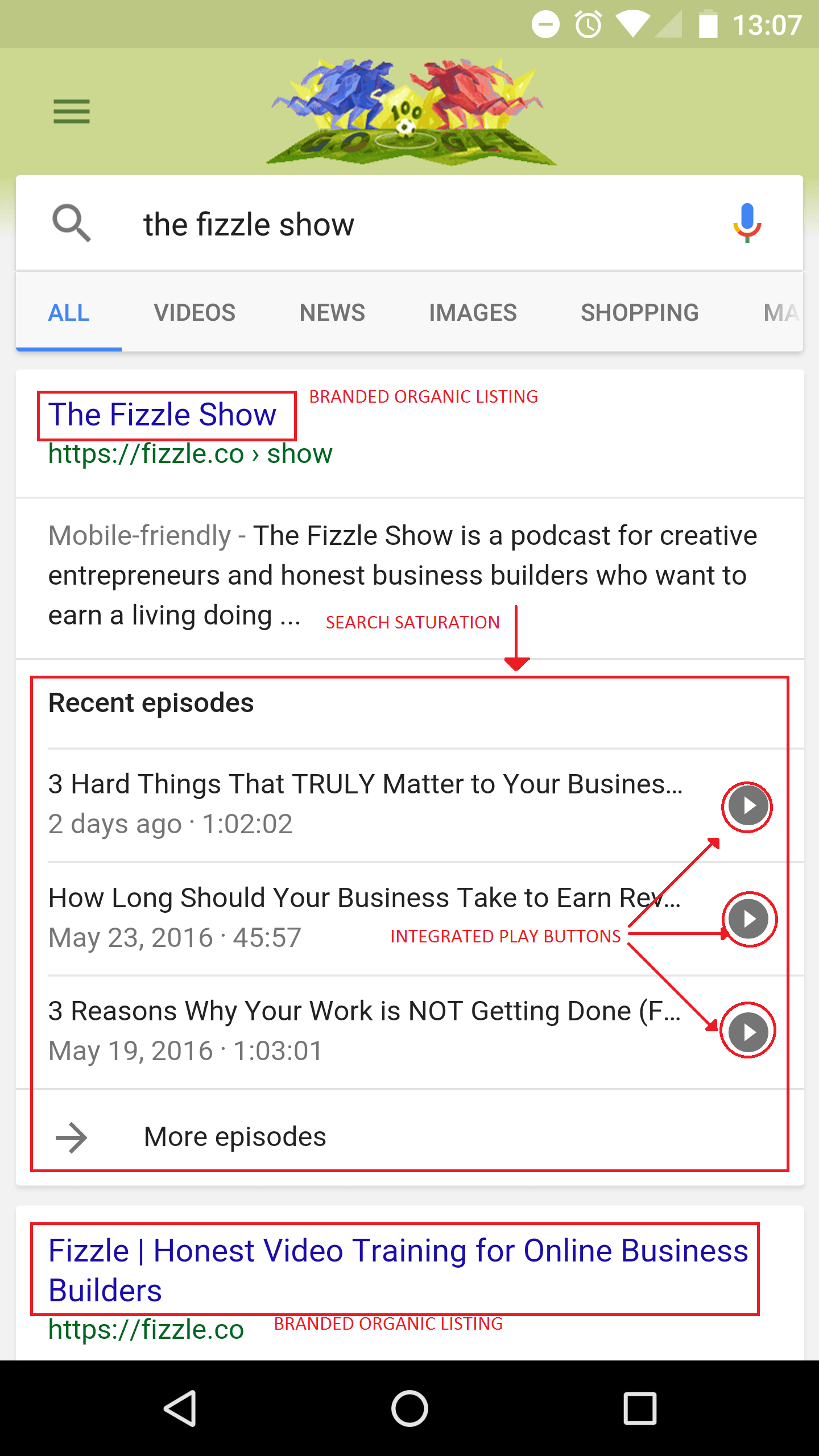 The results for The Fizzle Show are actually better than Harmontown since every result above the fold directs to Fizzle.co. Having a dedicated domain for The Fizzle Show ensures that they’ll show up for branded searches, and that their podcast episodes will take up more space underneath them that might go to their competitors.
The results for The Fizzle Show are actually better than Harmontown since every result above the fold directs to Fizzle.co. Having a dedicated domain for The Fizzle Show ensures that they’ll show up for branded searches, and that their podcast episodes will take up more space underneath them that might go to their competitors.
Naturally, it also empowers Android users to start a relationship with your brand right from search results. We can’t quantify that kind of encounter with 100% certainty, but it certainly won’t hurt your brand’s interaction with potential customers.
Experiment #3: Company-produced podcasts
Now that we’ve covered podcasts that are made for podcasting’s sake, let’s take a look at an example of a podcast made by a company. We’ll use The Message, a brief podcast produced by General Electric in 2015 that burst into stardom with more than 1 million listeners during its eight-episode lifespan.
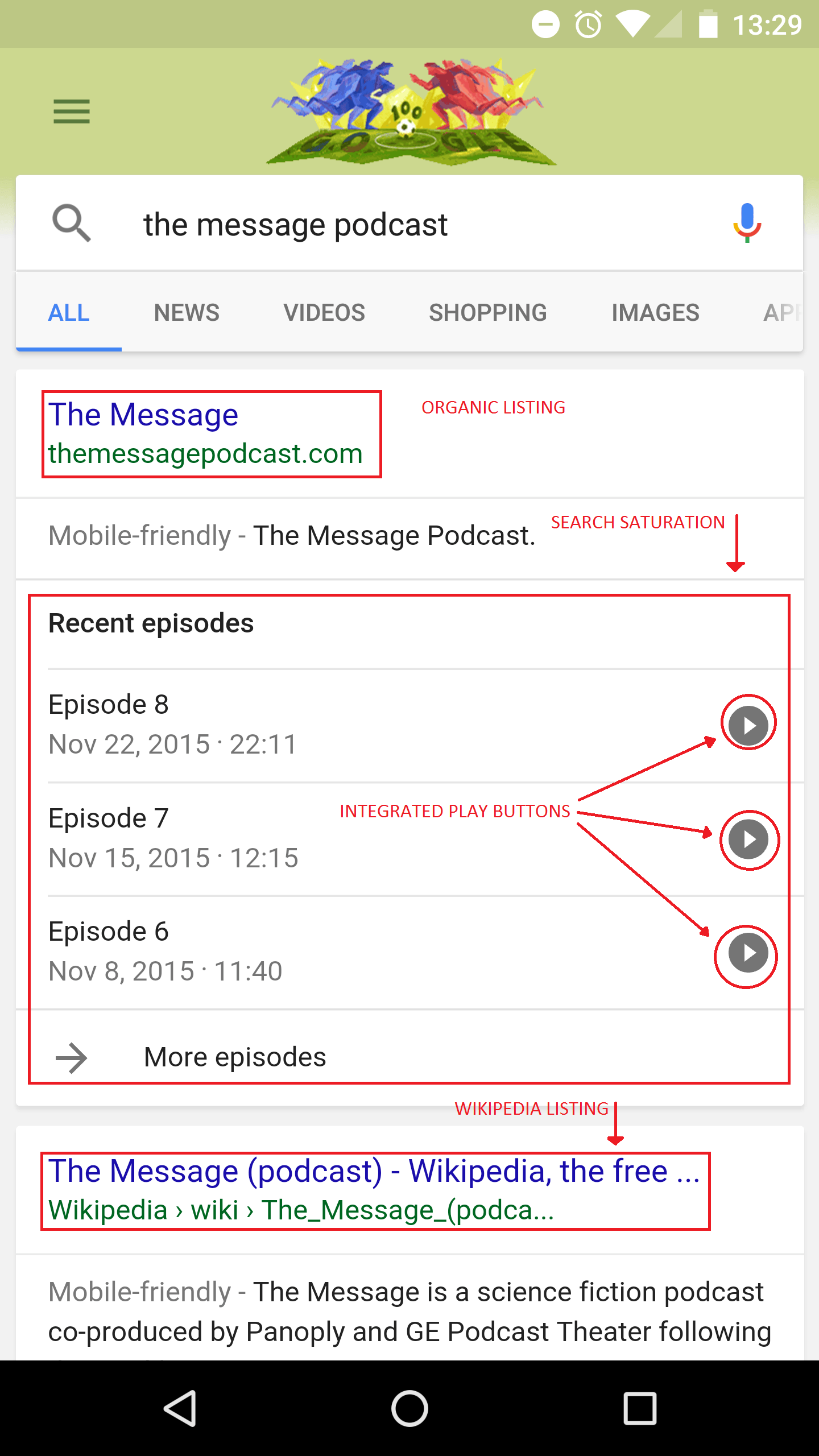 GE made a separate domain for The Message, ran it over eight weeks, and then stopped it dead. But that didn’t stop The Message from getting its own Wikipedia page — plus a lot more.
GE made a separate domain for The Message, ran it over eight weeks, and then stopped it dead. But that didn’t stop The Message from getting its own Wikipedia page — plus a lot more. 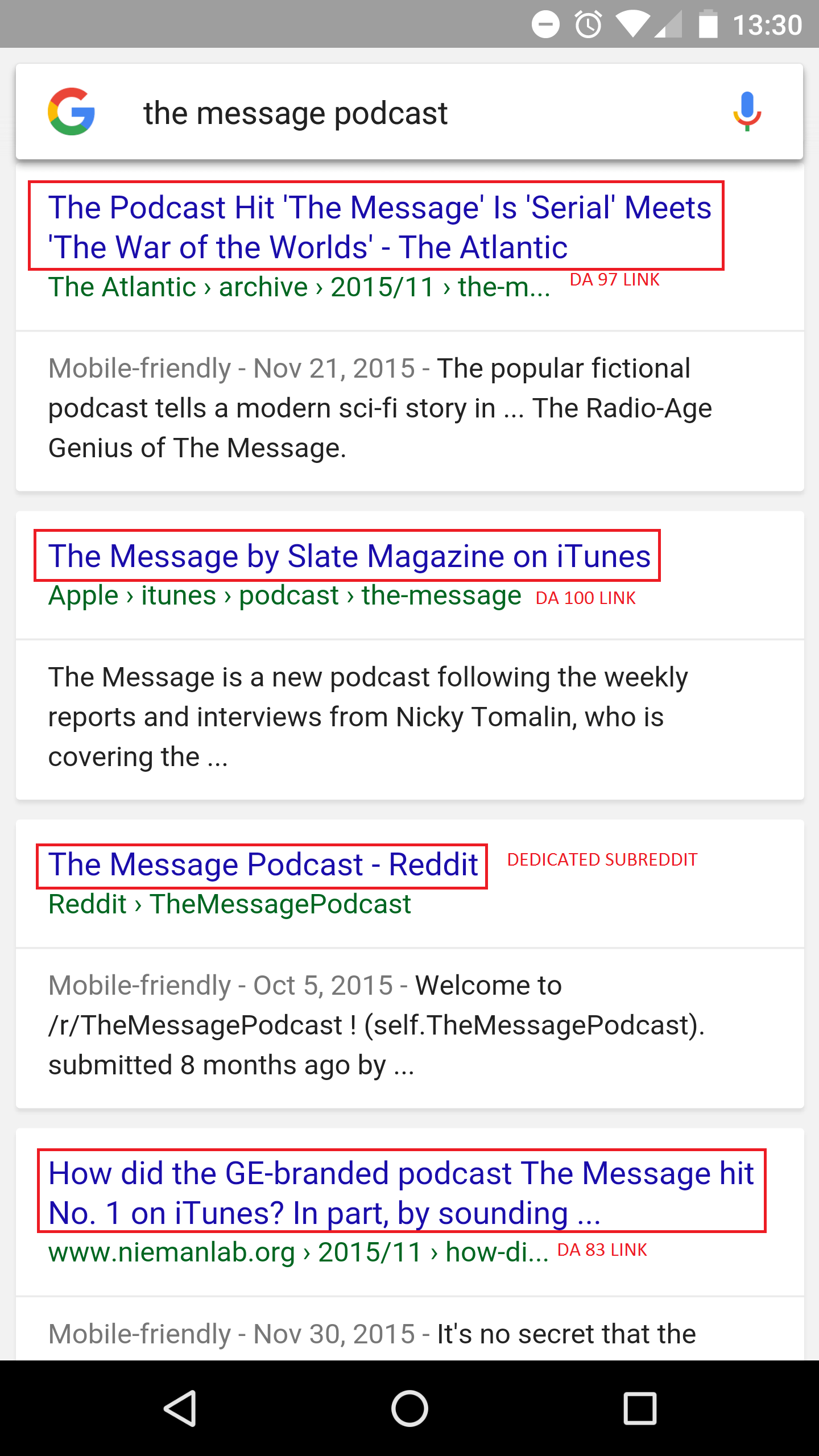 After Wikipedia, The Message also got attention from The Atlantic, Apple, Reddit, and Nieman Lab, among others.
After Wikipedia, The Message also got attention from The Atlantic, Apple, Reddit, and Nieman Lab, among others.
That’s a lot of fresh links from reliable news and podcasting sources, plus a coveted prize that almost no company ever gets — an active, dedicated subreddit. With all of that, GE turned a simple radio show into a worldwide phenomenon. And by the way — The Message had nothing to do with GE at all.
It was a science fiction podcast, but GE still got the credit for producing a runaway hit. GE created a fantastic opportunity to raise brand awareness and dominate search results with one of the most well-known company podcasts in history. Nearly every site that mentioned The Message mentioned GE as well.
And even if those sites just linked to The Message’s single-page site, it still meant that potential customers were listening to GE material. Again, there’s not a great way to measure that kind of interaction — but GE at the very least created positive relationships with lots of listeners across a broad customer demographic. 1 million people may not sound like much — but when you consider the near-zero cost of production, it’s quite an accomplishment.
The takeaways
First of all, you’ll notice that all of these searches were performed on an Android phone.
Currently, Google doesn’t push individual episodes of a podcast on desktop results. But that may change. Google constantly updates their algorithm and search results, so who’s to say that podcasts won’t show up on all devices sometime soon?
At the very least, it’s a great way to bump your competitors, especially for branded searches. You also have a choice in how your podcast works. You can create it to stand alone — like The Fizzle Show — or incorporate it directly into your business model — like The Message.
Either way, you can build an audience and reach more people than ever before. Finally, podcasts open the doors to growth by enabling you to post your content on networks and distribution platforms that give you brand exposure to customers who couldn’t find you otherwise. All in all, that’s a lot of good to come from an incredibly small investment.
How you can use podcasting and SEO
To create a successful podcast, all you need to do is take content you’ve already made and talk about it in detail.
You can also set aside audio-specific content ideas that’ll make good podcast episodes. Podcasts are essentially audio blogs, and you can even use them as supplements to your current blog posts. They’re especially helpful in today’s age of on-the-go, mobile-heavy Internet use.
Listeners can enjoy your podcast anywhere, too. They don’t have to read a blog — they can listen to you while they’re in the car, on a walk, or anywhere else.
How to start your company’s podcast
Here’s what you need to create a podcast:
- Microphone & stand
- Mixer (for more than one mic)
- Audio cables
- Recording / editing software
- Headphones
- Distribution
Let’s take a look at all of these in more detail.
Microphone & stand
Recommendation: $20 vocal microphone (female jack), $18 microphone stand Good microphones are surprisingly easy to find. You can get a solid vocal mic for $20. As long as you record in a quiet, sound-insulated room, a simple mic will do the job. Make sure you keep your door closed when you’re recording, and don’t let anyone enter or exit while recording.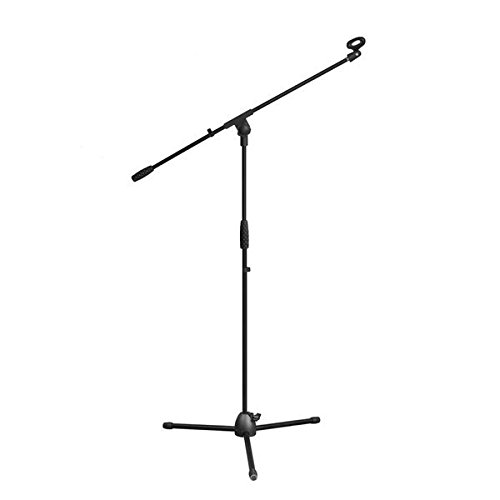 It’ll save you a lot of time editing later. (You may also need: 1/8” to 1/4″ jack converters; 1/4″ to 1/8” jack converters)
It’ll save you a lot of time editing later. (You may also need: 1/8” to 1/4″ jack converters; 1/4″ to 1/8” jack converters)
Mixer
Recommendation: $69 audio mixer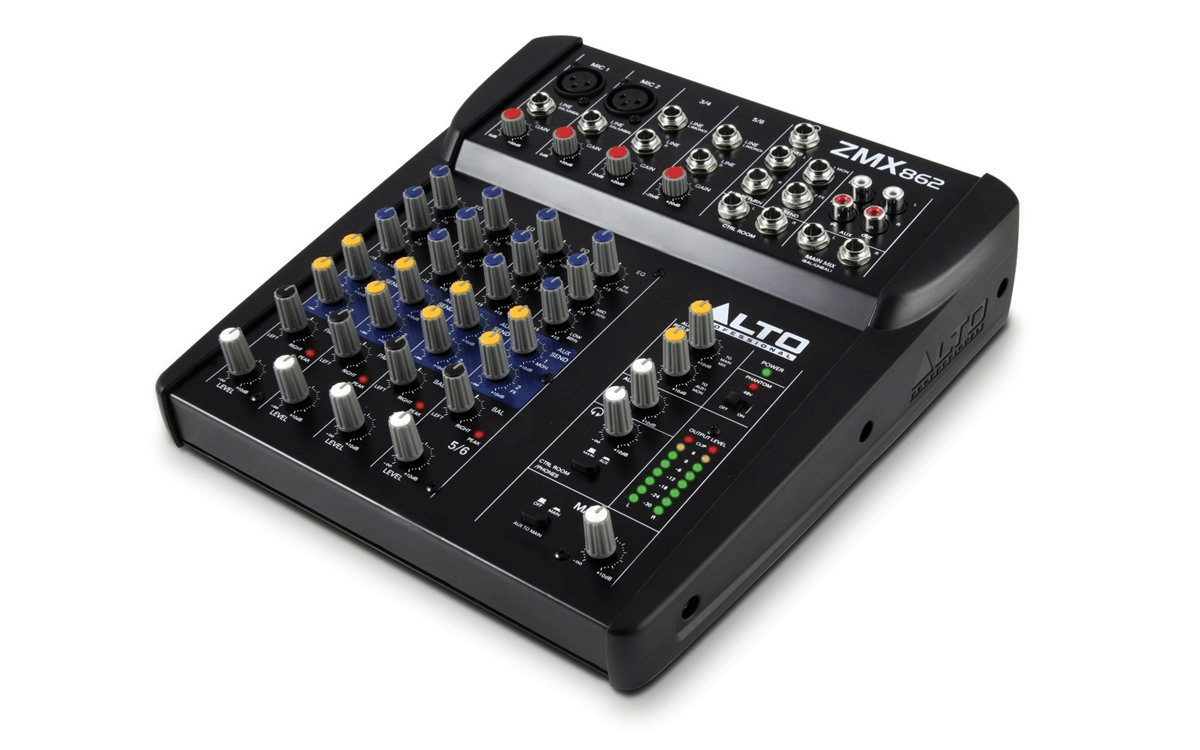 Mixers allow multiple microphones to plug into the same recording device at once.
Mixers allow multiple microphones to plug into the same recording device at once.
Think of it like a power strip for audio equipment. On a mixer, you can adjust bass, mid, treble, and overall levels to make sure all of the people getting recorded are at the same volume. You can adjust those volumes while editing, but getting them right before you start recording will save lots of post-production time.
Note: Getting a mixer may mean also getting additional equipment, like cables and headphones.
Audio cables
Recommendation: $13 mic-to-PC cable (mic & 1/8” jack)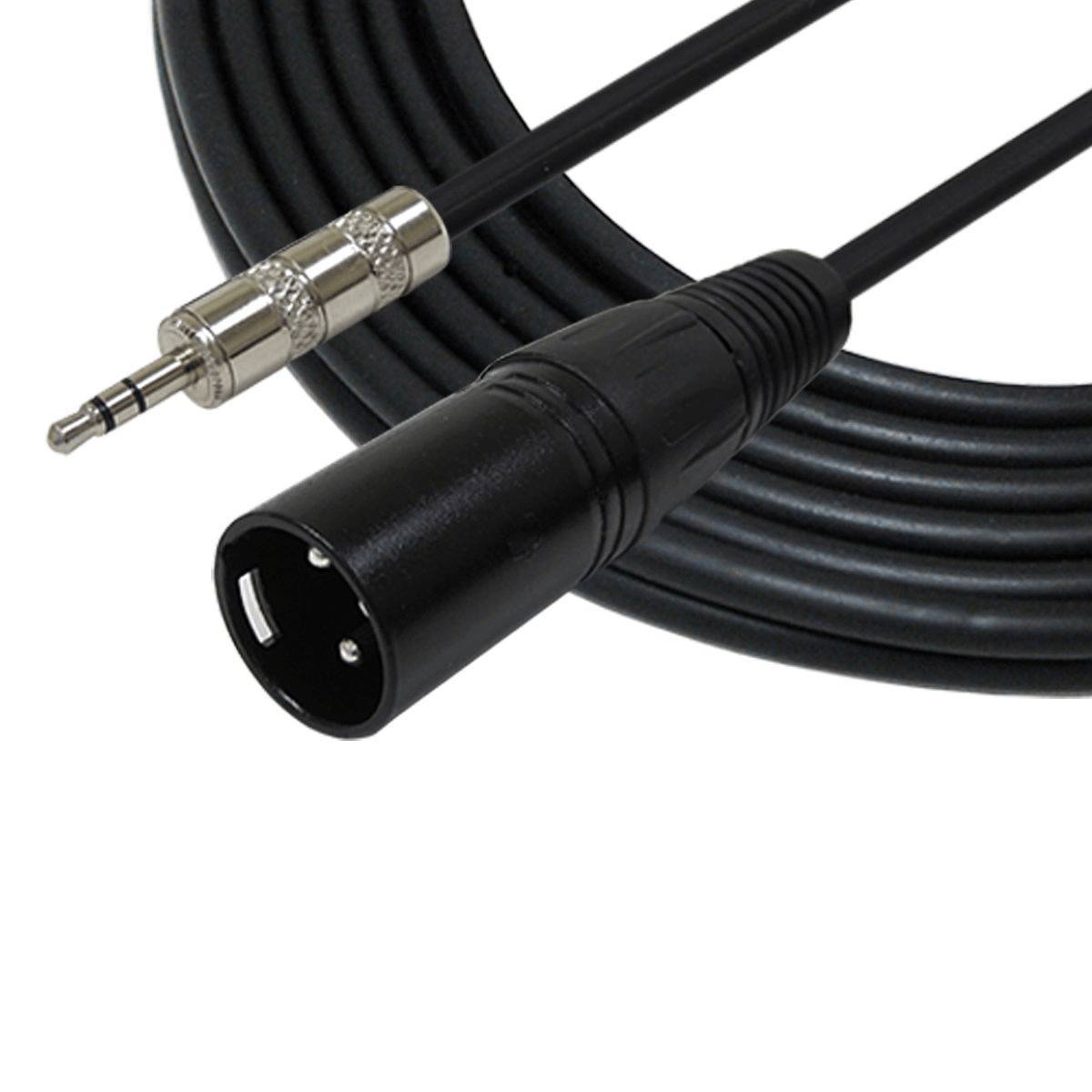 Audio cables are the connections that carry sound from your microphone to your mixer or your computer. They’re essential to any audio operation. These are pretty cut and dry.
Audio cables are the connections that carry sound from your microphone to your mixer or your computer. They’re essential to any audio operation. These are pretty cut and dry.
You need coaxial cables to watch cable TV or use cable Internet, and you need audio cables to record voices.
Recording / editing software
Recommendation: Audacity (free) Editing software can get really expensive — especially the professional-grade stuff. But Audacity is arguably just as good as professional programs, and it’s 100% free. You don’t pay for the download, and you don’t pay for a subscription.
Editing software can get really expensive — especially the professional-grade stuff. But Audacity is arguably just as good as professional programs, and it’s 100% free. You don’t pay for the download, and you don’t pay for a subscription.
It doesn’t even have any ads. For those reasons, Audacity has become the favored program of many audio editors. The editing process in general takes more time than recording and publication combined.
Audacity is one of the best podcast software that streamlines the process as much as possible.
Headphones
Recommendation: $15 full-coverage headphones (1/8” jack) Headphones are essential for recording. Without them, you’ll either have feedback from your speakers that continuously plays voices, or you’ll have to mute your whole sound system and not hear how you sound. Either alternative will hurt your final product.
Headphones are essential for recording. Without them, you’ll either have feedback from your speakers that continuously plays voices, or you’ll have to mute your whole sound system and not hear how you sound. Either alternative will hurt your final product.
Full-coverage headphones tend to be better than earbuds because they have bigger woofers that give you a clearer sound with more bass. That means you can hear what your listeners will hear at its best quality. Surprisingly, these headphones are durable and well-made for how affordable they are.
I’ve personally owned a pair for three years, and they’re still just as good as the day I got them.
Distribution
Recommendation: iTunes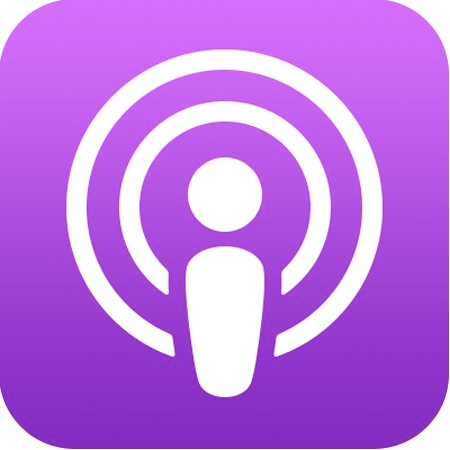 iTunes is the podcast powerhouse. If you want to get discovered, you need to use iTunes. Follow their criteria and guidelines, and then submit your podcast when it’s ready.
iTunes is the podcast powerhouse. If you want to get discovered, you need to use iTunes. Follow their criteria and guidelines, and then submit your podcast when it’s ready.
It might take a while, and it might be a little bit of a headache, but it’ll be worth it to have your podcast on the biggest podcast network in the world.
Total cost to start a podcast: $135
It doesn’t cost much to start a podcast. And keep in mind — this is all up-front, and there aren’t any recurring costs. The only way this total could increase is if you decide to buy more equipment for multiple people to record at once.
Have you started a corporate podcast?
Do you have a company podcast?
Have you seen the SEO benefits of using it? Let me know in the comments!
-
 Trevin serves as the VP of Marketing at WebFX. He has worked on over 450 marketing campaigns and has been building websites for over 25 years. His work has been featured by Search Engine Land, USA Today, Fast Company and Inc. Read his review of working with WebFX for the last 15 years.
Trevin serves as the VP of Marketing at WebFX. He has worked on over 450 marketing campaigns and has been building websites for over 25 years. His work has been featured by Search Engine Land, USA Today, Fast Company and Inc. Read his review of working with WebFX for the last 15 years. -

WebFX is a full-service marketing agency with 1,100+ client reviews and a 4.9-star rating on Clutch! Find out how our expert team and revenue-accelerating tech can drive results for you! Learn more
The Internet in Real Time
Ever wonder how much is going on at once on the Internet? It can be tough to wrap your mind around it, but we’ve put together a nice visual that’ll help! The numbers show no sign of slowing down either.
Find out More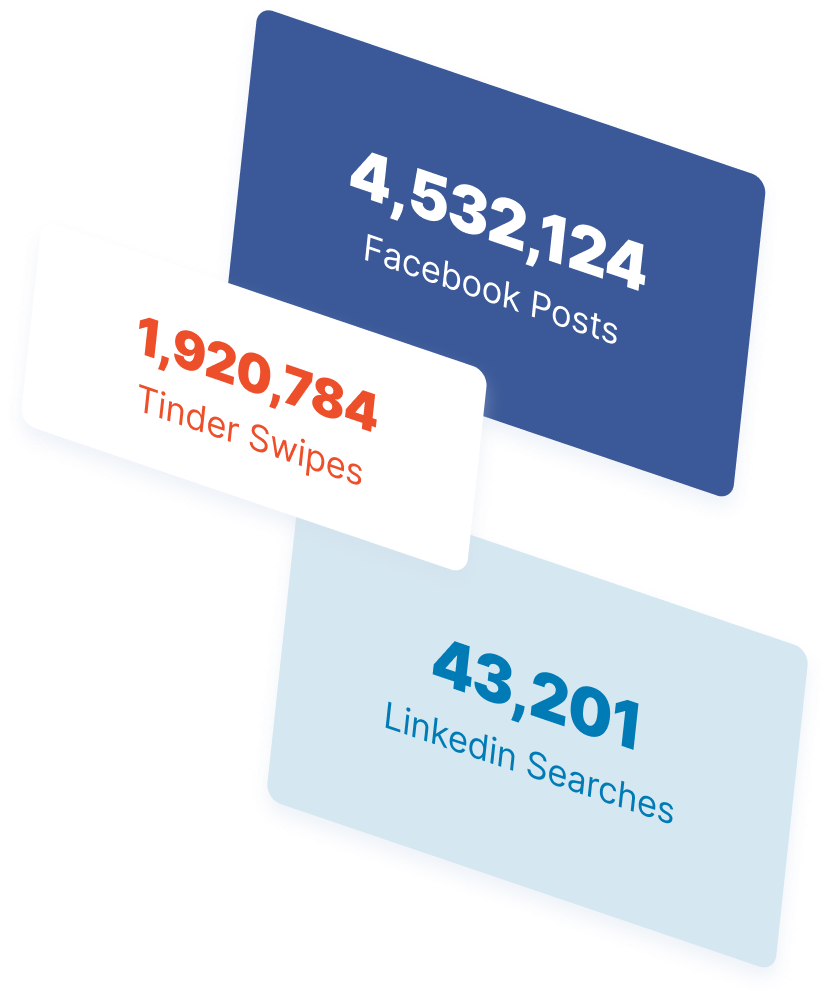
Table of Contents
- How podcasting and SEO work together
- Experiment #1: An ordinary podcast
- Experiment #2: Business podcast with dedicated domain
- Experiment #3: Company-produced podcasts
- The takeaways
- How you can use podcasting and SEO
- How to start your company’s podcast
- Microphone & stand
- Mixer
- Audio cables
- Recording / editing software
- Headphones
- Distribution
- Total cost to start a podcast: $135
- Have you started a corporate podcast?

Ready to Drive Results for Your Business?
See how WebFX uses SEO, PPC, Social Media, and Web Design to Drive Revenue for Businesses.
Get Inspired
Proven Marketing Strategies
The Internet in Real Time
Ever wonder how much is going on at once on the Internet? It can be tough to wrap your mind around it, but we’ve put together a nice visual that’ll help! The numbers show no sign of slowing down either.
Find out More
What to read next


